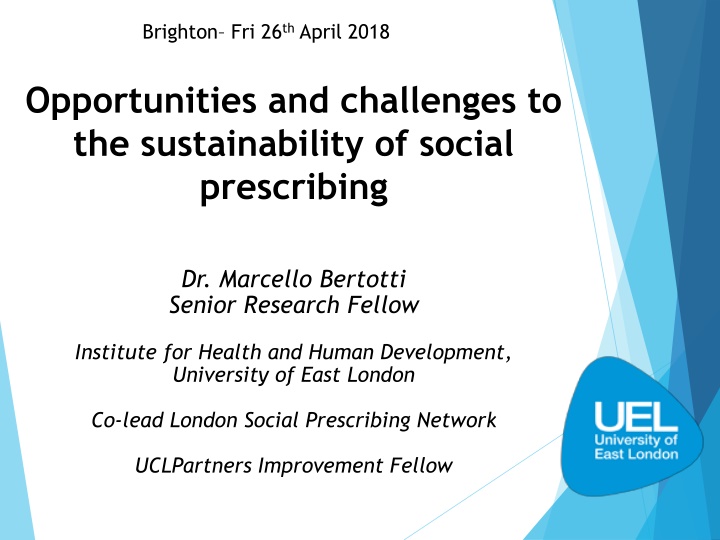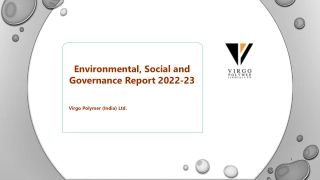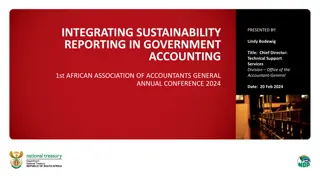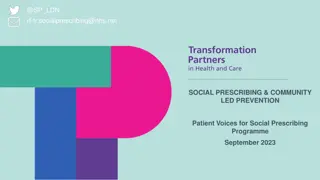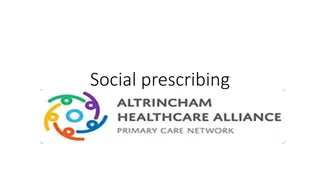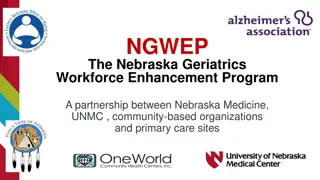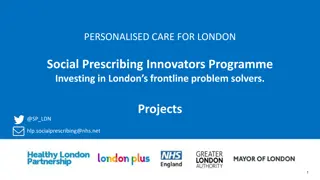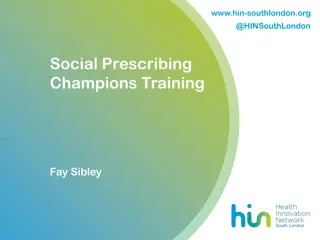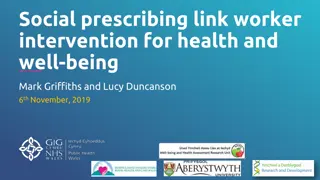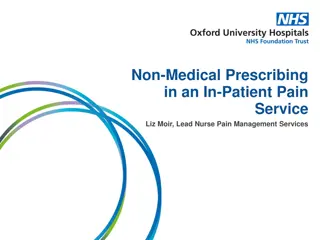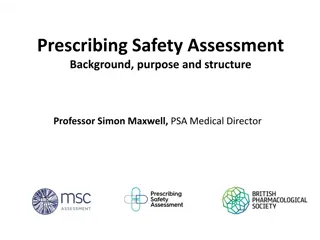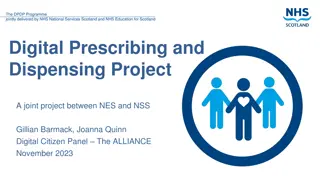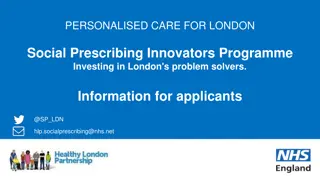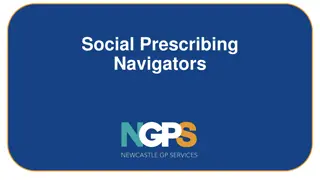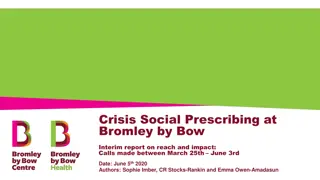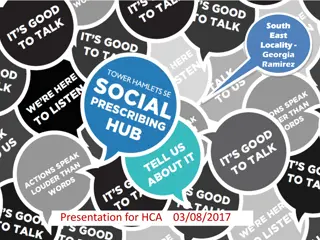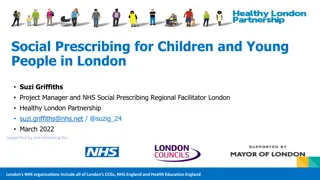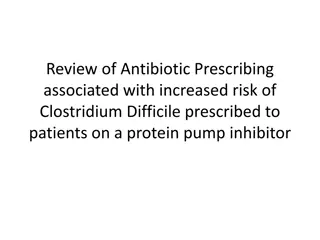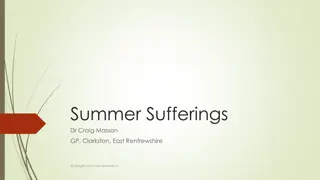Opportunities and Challenges in Social Prescribing Sustainability
Social prescribing is crucial for addressing non-medical issues impacting healthcare. Dr. Marcello Bertotti discusses the need for social prescribing, its structure, and its role in primary care. The initiative targets frequent GP visitors, those with long-term conditions, and individuals in disadvantaged areas. By connecting patients to non-clinical services, social prescribing aims to enhance well-being and reduce healthcare costs. The model involves various stakeholders, including healthcare professionals, social workers, and voluntary organizations.
Uploaded on Feb 25, 2025 | 0 Views
Download Presentation

Please find below an Image/Link to download the presentation.
The content on the website is provided AS IS for your information and personal use only. It may not be sold, licensed, or shared on other websites without obtaining consent from the author.If you encounter any issues during the download, it is possible that the publisher has removed the file from their server.
You are allowed to download the files provided on this website for personal or commercial use, subject to the condition that they are used lawfully. All files are the property of their respective owners.
The content on the website is provided AS IS for your information and personal use only. It may not be sold, licensed, or shared on other websites without obtaining consent from the author.
E N D
Presentation Transcript
Brighton Fri 26thApril 2018 Opportunities and challenges to the sustainability of social prescribing Dr. Marcello Bertotti Senior Research Fellow Institute for Health and Human Development, University of East London University of East London Logo Co-lead London Social Prescribing Network UCLPartners Improvement Fellow
Outline Why do we need social prescribing and what is it? Key opportunities and challenges for the sustainability of social prescribing Concluding remarks
WHY DO WE NEED SOCIAL PRESCRIBING? Frequent attenders to primary care: In the UK, 20% of patients attend GP for social rather than medical reasons. It costs the NHS 395m per year (Citizen Advice, 2016) Increasing rate of Long Term Conditions. E.g. diabetes. The WHO (2012) estimated that in 2012 620,000 died of human violence (war and crime), 1,500,000 died of diabetes. Sugar is more dangerous than gunpowder (Harari, 2017). Persistent level of health inequality (Cawston, 2011). This lead to long-term medical conditions and particularly affects people in disadvantaged areas
WHAT IS SOCIAL PRESCRIBING? PATIENT Primary Care (GP) CLIENT USER Statutory sector (e.g. LA; Housing) *TIME WITH A NON- CLINICAL LINK WORKER PERSON ? ATTENDANCE in VCSE sector Allied HCP Secondary Care (Hospital) 4 Based on Polley (2018)
Patient/client/p erson/user Long term conditions (e.g. diabetes) mild/moderate MH problems, social isolation/loneliness, social problems (e.g. housing, employment) Primary, secondary care Statutory sector Allied HCP Link worker Voluntary sector
Patient/client/ person/user Primary/secondary care Statutory sector Allied HCP Mainly GP practices Social workers (local authority) Housing associations Pharmacies Link worker Hospitals Voluntary sector
Patient/client/p erson/user Primary, secondary care Statutory sector Allied HCP Coaching, motivation, listening Co-production with user Knowledge about community activities Intensity of support: Signposting (one session) Referring (flexible; > one session) Link worker Voluntary sector
Patient/client/ person/user Volunteering Housing and employment advice Psychological counselling Walking clubs; sport clubs Cook and eat sessions Lunch clubs Gardening Group art and dance Museum, books e.g. art on prescription Conservation Primary, secondary care Statutory sector Allied HCP Link worker Voluntary sector
KEY OPPORTUNITIES FOR SUSTAINABILITY OF SOCIAL PRESCRIBING
Financial sustainability the NHS funding gap is unsustainable (estimated at 16b by 2020/21, at the current level of savings) SP shows a decline in: GP consultation rates (28%), A&E attendance (24%) Emergency hospital admissions (6-33%) An average increase in Social Return on Investment ( 1: 2.3).
sustainability: growing evidence shows that SP improves health outcomes, social connections Social Prescribing can contribute to the financial sustainability of the NHS by complementing clinical treatment (bio-medical) with non- clinical support opportunities for patients (psycho-social).
Environmental sustainability: it promotes a different relationship between people and their environment. (e.g. natural health service). Shift to an asset based rather than deficit based system: voluntary sector: dynamism of the voluntary sector for the renewal of communities and urban areas. it creates social capital for the benefits of communities. Person centred: user has a voice in their treatment
KEY CHALLENGES FOR SUSTAINABILITY OF SOCIAL PRESRIBING
NHS is not funding SP nationally as yet despite financial cliff Prevention is still at the margins of NHS spending (in 2015, only 5.2% of NHS budget was invested in prevention ( 9.8b) The evidence base needs improving: Larger samples, longer follow ups, data monitoring, designs with control groups, more tailored outcome measures Voluntary and third sector funding has declined substantially following cuts to local authority budgets Need to work on ensuring buy-in from GPs
Conclusions (1/2) Encouraging news as social prescribing can help with: o Financial sustainability of healthcare delivery o Promoting a different relationship between people and their environment o Supporting the growth of resilient communities (through voluntary sector and social connections) o Promoting integration between health and social care However, in practice much more difficult: o The NHS has made steps in this direction but specific funding is not yet available at national level o Despite rhetoric, prevention is still a very small proportion of overall expenditure.
Thanks for listening For more information: Dr Marcello Bertotti m.bertotti@uel.ac.uk
Bickerdike, L et al (2017) Social prescribing: less rhetoric and more reality. A Systematic review of the evidence , BMJ open, 7, 2-18 Citizen s Advice (2016) A very general practice: How much time do GPs spend on issues other than health? https://www.citizensadvice.org.uk/Global/Ci tizensAdvice/Public%20services%20publicatio ns/CitizensAdvice_AVeryGeneralPractice_May 2015.pdf References Polley, M (2018) Review of our strategy.Social prescribin Network Strategy Meeting , 11th Jan 2018 Polley, M et al (2017) A review of the evidence assessing impact of social prescribing on healthcare demand and cost implications , University of Westminster
